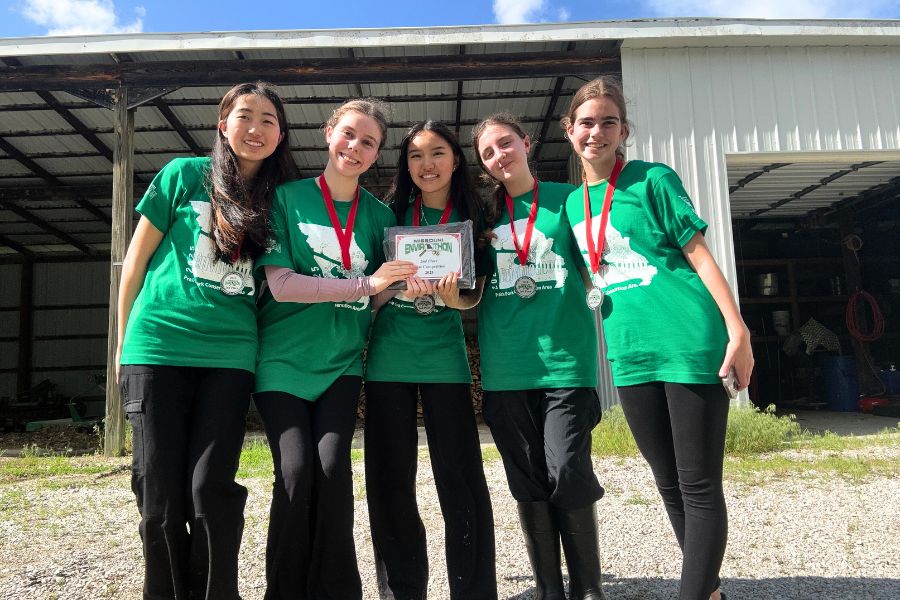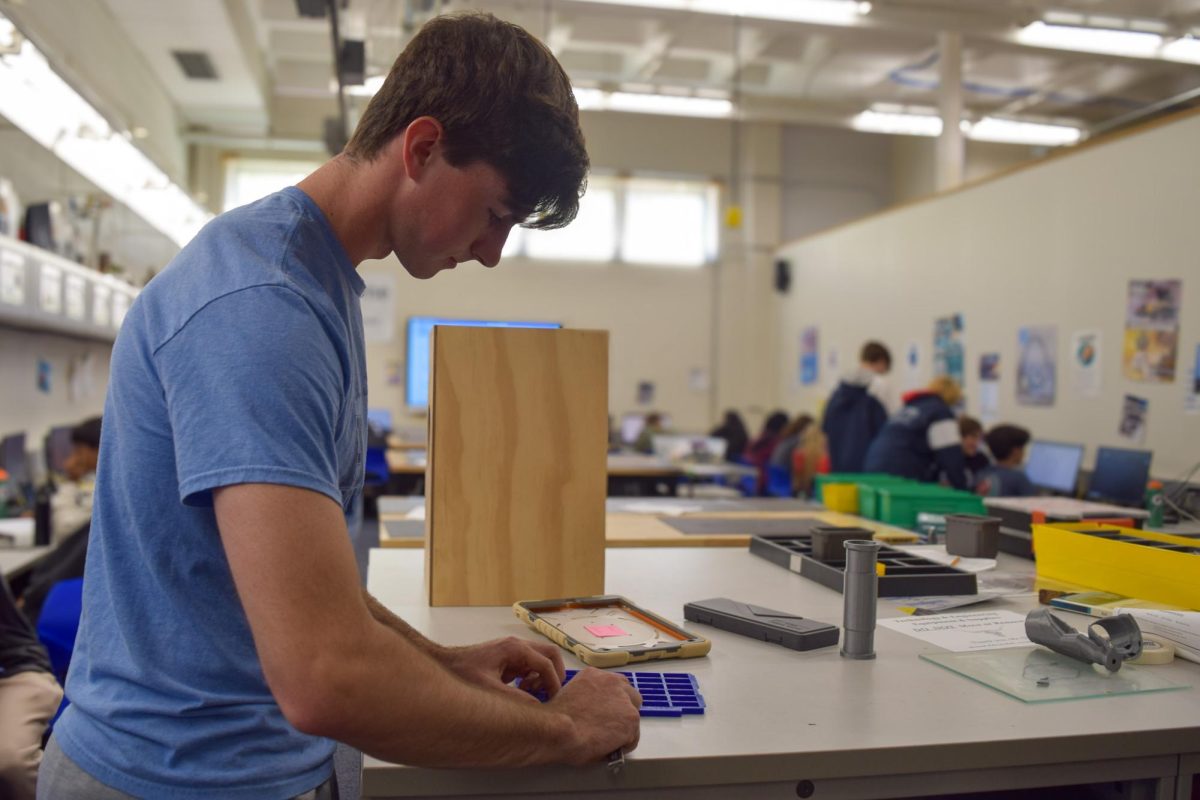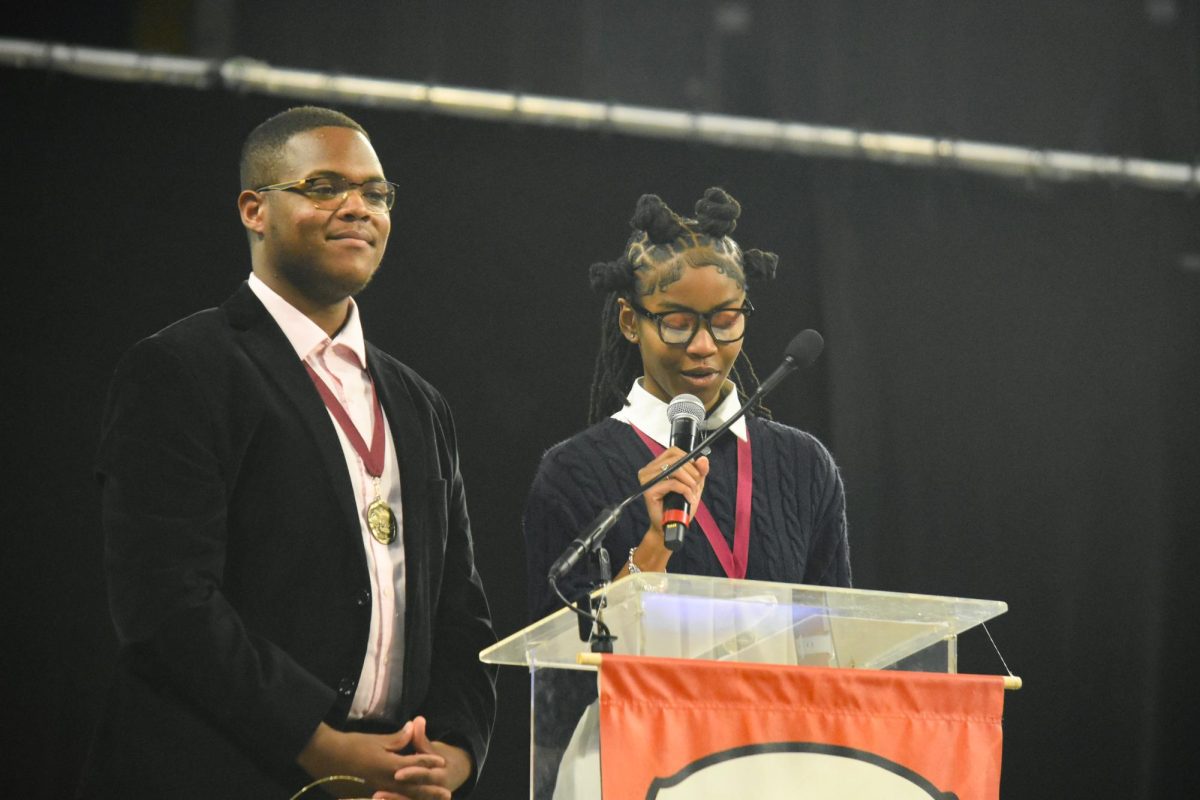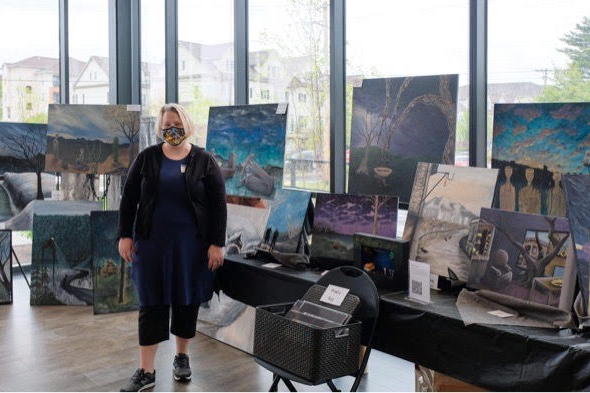![Social studies teacher Amy Thornhill writes her daily class agenda in front of the whiteboard. Thornhill teaches AP Human Geography, World History and Psychology and has witnessed difficulty for students to form an opinion recently in all of these classes. “Everyone's opinion is valid. Everyone's opinion is justified. But [when] you have so many opinions. It's hard for kids to figure out their [own]. Those are the things I try to articulate and get kids to understand,” Thornhill said.](https://pwestpathfinder.com/wp-content/uploads/2023/06/unnamed-e1685623545392.jpg)
Social studies teacher Amy Thornhill knows that current events play a major role in the topics she teaches in her classes. Thornhill constantly updates lesson plans to fit the news around the globe because she believes in the importance of keeping students up to date on current events.
Thornhill determines what current events fall into the class and category she’s teaching. For her World History and Psychology classes, it can be challenging to integrate current events since their curriculums either revolve around the past or relate to biology.
“If it’s World History, it’s hard to get to current events. I will weave in events that match the historical events we’re learning about. In Psychology, I will try to bring up relevant issues within that curriculum, usually dealing with mental health. Recently we were [learning about] the stages of development [and] the issue of what we do in society if somebody wants to change genders,” Thornhill said.
AP Human Geography connects to current news more because the curriculum already revolves around politics and culture around the globe. The curriculum dates back to 1945; the textbook was published in 2014.
“In my AP Human Geography class, the task becomes staying current and relevant. We had to constantly make sure that we were exposing students to current events, like the situation in Ukraine and Sudan,” Thornhill said.
Although Thornhill believes it is important to expose students to news worldwide, some events can be too horrific or cause much sensitivity.
“[Some current events] are a bit more sensitive, like the [identifying gender] one [in] Psychology. I thought through bringing that up [because I didn’t know if it was too much. However], being juniors and seniors, we want to prepare our students to understand both sides, so oftentimes I feel [the] need to err on the side of caution with a current event,” Thornhill said.
In recent years, Thornhill’s curriculum has changed with the events of Donald Trump’s presidency and the role of social media in elections.
“It’s more polarized, meaning you hear the loudest voices on both sides. I have to go back to the basics and make sure kids understand those rapid changes [due to the role of social media] because, within a lifetime of a 14-year-old, you aren’t going to see those changes,” Thornhill said.
Although Thornhill has not received any backlash or messages from parents, some of her lessons cause students to become more emotional than others.
“[After] teaching about the Palestinian-Israeli debate. I’ve had Palestinian students speak with me one-on-one about the impact that the lesson made on them. I’ve had students who have lived in Israel or have connections and ties directly to Israel who have also spoken to me about that lesson. In AP Human Geo, the topics dealing with poverty [left] students feeling bad because so many people around the world live in less developed countries and struggle daily,” Thornhill said.
Because teaching has become opinionated and politicized, many educators are concerned with the accuracy and bias of the news.
“It honestly scares me that teenagers are only hearing the polarized view of people on social media. There are so many academics out there who write papers that give historical context and data and present findings based on facts. It does make me nervous that students tend not to want to read those items. It also makes me nervous that many media outlets are openly opinionated. They’re not trying to hide their bias [like] they were in decades past. My fear is that students will give up trying to be informed because it takes mental effort and a lot of weeding through what’s true and what’s not. That makes me nervous for the future of society,” Thornhill said.
Thornhill hopes that students will continue to educate themselves on accurate and unbiased current events.
“Make sure you’re finding other ways to educate yourself and find out the pros and cons of either a candidate or particular issue [by] staying up to date on local, state, federal and international news stories,” Thornhill said.



![Senior Adam Zerega stands with senior Dexter Brooks by farm equipment. Zerega often worked with friends and family on his farm. “I've been able to go to my family's farm since I was born. I [spend] at least three weekends a month [on the farm], so I'm there all the time,” Zerega said.](https://pwestpathfinder.com/wp-content/uploads/2025/04/IMG_4872-1200x900.jpg)

![Phage grown by senior Rio Naghibi Harat sit in petri dishes. Through Webster University, Naghibi Harat was given the opportunity to develop phage as a potential remedy for tuberculosis. “Phage are everywhere. I got mine from a soil sample. I'm not kidding; I picked [it] up from dirt. They're harmless, unless you code them to do something, and they can evolve. Virus antibiotics can't. They're one solid molecule. A strain of this bacteria [can evolve] that is resistant to [a] particular drug, [but] phage will evolve with the bacteria. They can see the changes, and they can be the change,” Naghibi Harat said.](https://pwestpathfinder.com/wp-content/uploads/2025/04/Flag-2.png)
![Hosting a meeting for Women’s History Month, co-president Bethany Liao converses with club members of Women in Healthcare. The event fostered discussions about women in medicine and included a third year medical student from Bosnia as a guest speaker. “Creating this club has been a net positive experience for everyone. After we present [or a guest speaker], we [also] usually have snacks for everyone and it gives people an opportunity to generally talk or discuss,” Liao said.](https://pwestpathfinder.com/wp-content/uploads/2025/04/DSC0032-1-1200x800.jpg)


![Scrolling on eBay, sophomore Ryder Williams searches the app for different shoe styles. Williams credits the impact his completion of business and finance courses have had to gain his financial success, as well as his Personal Finance teacher, Andy Croley. “Croley helped me a lot in getting to know more about profit and where to put the money. [He] also [taught me] how to store my money, ways to invest it [and] that I should always have emergency funds,” Williams said.](https://pwestpathfinder.com/wp-content/uploads/2025/02/ryder-fea-3-1200x800.jpg)


![Business and personal finance teacher Evan Stern stands in front of his classroom. After facing hardships growing up, Stern learned how to deal with them with the help of role models like his dad. “We dealt with some trauma when I was in middle school, and my dad had to be responsible for all three of us while he was working full-time. I know he had to sacrifice a lot. I'm sure it was really hard for him, but looking back on it, he did a really good job . I didn't appreciate everything that he did at the time because I was so young. Now, I'm engaged and probably going to have kids of my own in the next couple of years so I [am starting] to look at things differently,” Stern said.](https://pwestpathfinder.com/wp-content/uploads/2024/02/Untitled-7-1200x900.jpg)
![Holding his two smiling daughters in his arms, Principal John McCabe celebrates earning his doctorate degree. He attended Maryville University for two years and reached his goal of achieving a Doctor of Education: Educational Leadership degree after months upon months of hard work and long nights. “I'm not going to lie, I'm glad I have another night of my life back when I'm not at school till very late,” McCabe said. “I can spend more time with my family and with my friends [who] are here at [West]. I'm really happy about that.”](https://pwestpathfinder.com/wp-content/uploads/2024/01/mccabefeature.png)
![Art teacher Katy Mangrich sits in her classroom, smiling for a picture. During her time in high school, Mangrich learned several lessons that she now passes on to her son. “The biggest life lesson that I learned is honesty. I wouldn't say I was the best teenager, but I learned very quickly in high school to always be forthcoming and honest with my parents because it always ended up serving me better in the long run. [My parents] might have been upset with me [and the mistake I made], but I wasn't going down the rabbit hole of a lie because that was just going to get me into more trouble,” Mangrich said. “I passed [that lesson] along to my nephew. Honesty is always your best approach; just don’t lie. I say that to my son all the time. There's no advantage to lying, [and] that's a huge takeaway [from] how my parents raised me.”](https://pwestpathfinder.com/wp-content/uploads/2024/01/Screenshot-2024-01-26-10.10.12-AM.png)
![Social studies teacher Aaron Bashirian smiles in front of his classroom. Bashirian didn’t know he wanted to be a teacher from early on, but he found the choice to be a good one. “I started [teaching] because there was an opportunity for me to experiment with it. Fortunately, [teaching] was a good choice. In 2012, I became a teacher at Parkway at the Alternative Discipline Center, which is where they send suspended kids to keep being educated if they choose. I spent six years there and then I got drafted to West, [where] I've been for about six years,” Bashirian said.](https://pwestpathfinder.com/wp-content/uploads/2024/01/Untitled-35-1200x800.jpg)
![English teacher Angela Frye stands behind her desk in her classroom. Frye went through a lot of personal struggles to get to where she is today, and with each step in her life, she carries her gratitude for those obstacles. “Everything happens for a reason. I believe in [the concept of] good energy, good karma, [from] being a good person. Those are things I don't take lightly. [Struggles] build character. You really appreciate everything you have when you have to work for everything you have,” Frye said.](https://pwestpathfinder.com/wp-content/uploads/2023/11/Untitled-8-1200x800.jpg)
![Business and personal finance teacher Andy Croley stands in front of his 5th hour, Intro to Business. In high school, business was the class Croley enjoyed most. “Business class was my favorite course in high school. I didn't know that was something I wanted to teach coming out of high school, but I wanted a business degree and to own my own business. When I entered university, I thought about a [teaching] avenue. I met with my advisor and looked at different departments. I fell in love with the people in the education department, the professors and the coursework, because it tied right into what I loved about the class when I was in high school. I fell in love with it even more when I was student teaching,” Croley said.](https://pwestpathfinder.com/wp-content/uploads/2023/11/DSC_0008-2-1200x800.jpg)

![Art teacher Kat Briggs poses for a picture in her art room. Briggs grew up loving art, and now is fulfilling her passion. “My own experiences that I had outside the classroom with my own art teacher made me realize that there are skills that I can use outside of the classroom,” Briggs said. “Encouraging the students and also showing interest in the things that they do, whether it's extracurriculars or their own hobbies and interests that they enjoy doing in their free time, is something I like to [do to] feel engaged with them. The classroom is a snapshot, it's 90 minutes of just seeing somebody in one context, [but] everybody is so much more than that,” Briggs said.](https://pwestpathfinder.com/wp-content/uploads/2023/10/image3-3-1200x800.jpg)
